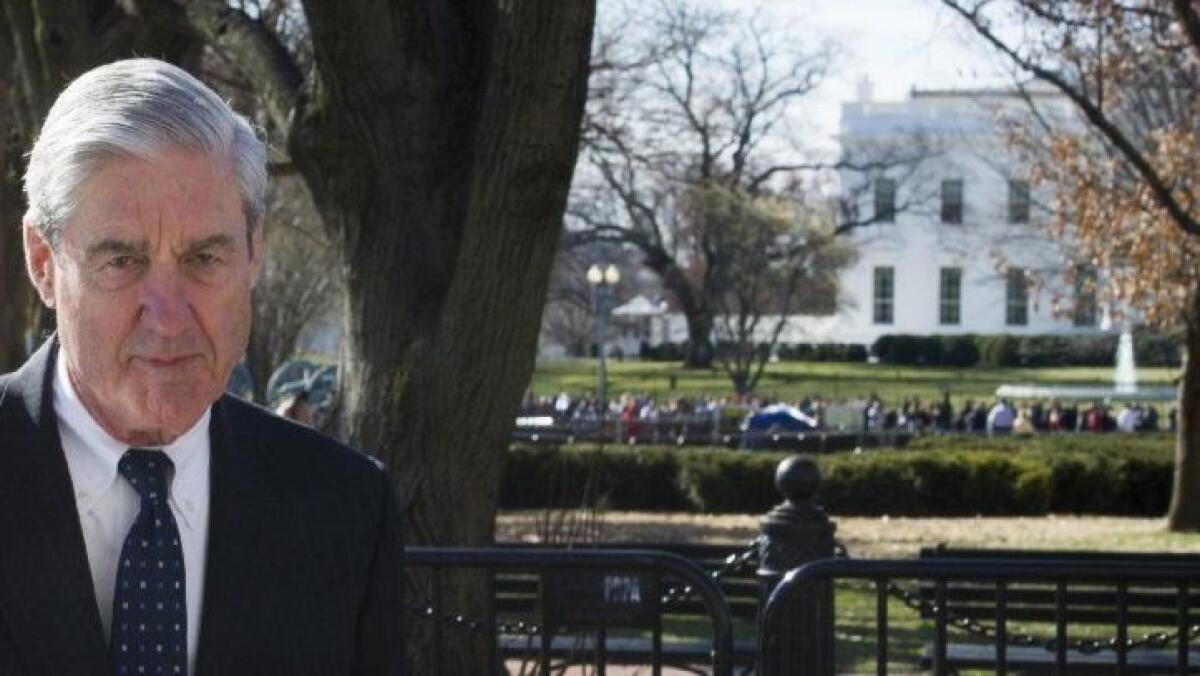Analysis:: Why Mueller didn’t make a recommendation on whether Trump obstructed justice

- Share via
Reporting from Washington — The crime of “obstruction of justice” is familiar to many because it drove the impeachment proceedings of two presidents.
President Nixon resigned when he faced impeachment for obstructing justice by covering up the White House role in the break-in at the Watergate offices of the Democratic National Committee. And President Clinton was impeached in the House for allegedly lying and obstructing justice to hide his sexual relationship with a White House intern.
The report by special counsel Robert S. Mueller III lifted part of the cloud over President Trump by concluding his campaign had not conspired with Russians to tilt the 2016 election.
But Mueller said he was unable to clear Trump of attempting to illegally interfere with the government’s Russia probe. Even so, the special counsel stopped short of charging Trump with obstruction of justice. His report offered at least three reasons for doing so.
First, Mueller said Justice Department policy forbids the “indictment or criminal prosecution of a sitting president.” Because Mueller was acting as a special prosecutor within the Justice Department, he said he had to follow this policy. This suggests Mueller believed that no matter what the evidence showed, he did not have the authority to charge the president with a crime.
“It is quite clear that Mueller did not make a final prosecution decision because of the [Justice] Department’s policy that presidents cannot be criminally prosecuted,” said Noah Bookbinder, a former federal prosecutor and the executive director of Citizens for Responsibility and Ethics in Washington.
Second, unlike a case in which an official seeks to cover up a crime, “the evidence we obtained did not establish the president was involved in an underlying crime related to Russian election interference,” Mueller’s report said.
In theory, defendants can be charged with criminal obstruction of justice even when they have not committed the underlying crime. However, it would strike many as wrongheaded to charge Trump with obstructing the Russia probe after a lengthy investigation concluded he and his campaign had not conspired with Russians in the first place.
“If there had been an underlying crime, there would have been a much stronger case,” said Laurie L. Levenson, a professor at the Loyola Law School in Los Angeles. “But there’s no break-in at the Watergate Hotel that needed to be covered up.”
Third, Trump may have been spared further trouble because his top aides ignored him at key moments.
“The president’s efforts to influence the investigation were mostly unsuccessful,” the report said, “but that is largely because the persons who surrounded the president declined to carry out his orders or accede to his requests.”
Among other things, Mueller cited Trump’s failed attempts to pressure Atty. Gen. Jeff Sessions to curtail the probe and force White House counsel Donald McGahn to fire Mueller. Both men refused Trump’s demands.
“What ends up saving him is that others in the White House did not follow through on his orders,” Levenson said. “This was not a clear-cut case of obstruction, but the report is not a clean bill of health, either.”
This mixed conclusion — outlining at times what Mueller calls “substantial evidence” of Trump’s efforts to obstruct without making a recommendation on charges — made for a perplexing outcome and left legal experts divided.
The law against obstructing justice is quite broad, as the report notes. It is illegal to hide evidence, intimidate witnesses, lie to investigators or “endeavor to influence, obstruct or impede” a pending investigation.
For about half the nation, that appeared to be exactly what Trump had been doing since shortly after taking office.
But motives are also critical. The law requires obstruction of justice be linked to a “corrupt” intent, such as urging a witness to lie under oath to mislead the grand jury.
Atty. Gen. William Barr — who controversially concluded that the president’s actions as described by Mueller did not constitute illegal obstruction — insisted that Trump was merely trying to defend his reputation out of a “sincere belief” that he didn’t conspire with Russia and therefore was being unfairly attacked.
But critics say Trump’s actions — firing FBI Director James B. Comey, trying to fire Mueller, moving to limit the scope of the probe and pressuring intelligence officials to speak out in his defense — laid out a clear case of illegal obstruction for Congress, or for future prosecutors after Trump leaves office.
“The Mueller report lays out a vast body of evidence of obstructive conduct by the president,” Bookbinder said. “This was a classic pattern of threats, firings and use of power to undermine an investigation. It is a danger if this is somehow normalized. It’s now up to Congress to take it from here.”
Jonathan Turley, a law professor at George Washington University, disagrees, saying he did not see a clear case of obstruction of justice. He said Mueller portrayed the president as angry about being under investigation.
“In my view, the report reveals more obsession than obstruction,” Turley said. “Trump comes across as someone who is obsessed with the investigation and its impact on his presidency. He was angry that Comey would not say in public that he was not under investigation. Had he fired Mueller, they might have a case. But what you are left with here is that the president issued orders and no one listened.”
More stories from David G. Savage »
More to Read
Get the L.A. Times Politics newsletter
Deeply reported insights into legislation, politics and policy from Sacramento, Washington and beyond. In your inbox three times per week.
You may occasionally receive promotional content from the Los Angeles Times.











